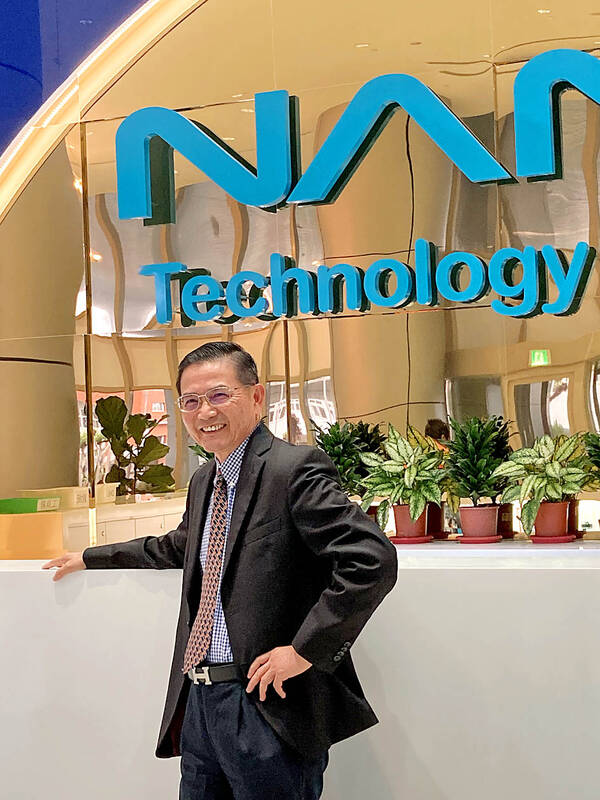DRAM chipmaker Nanya Technology Corp (南亞科技) yesterday said chip prices might stabilize next quarter, as improving inventory along the supply chain and industrywide production cuts have yielded initial results.
“We are feeling a slight [improvement],” company president Lee Pei-ing (李培瑛) said in response to a reporter’s question about the latest market conditions compared with last month.
“This is not extensive, but a gradual [pickup]. It is moving in a positive direction,” Lee said.

Photo: Lisa Wang, Taipei Times
The mild improvement is driven by a combination of factors including easing inventory pressure and smaller chip supply, Lee said.
TV demand also bounced back lately, he said.
To cope with sagging chip demand, Nanya Technology is adjusting its factory utilization within a range of 20 percent as previously planned, he said.
South Korean rivals Samsung Electronics Co and SK Hynix Inc also unveiled plans to scale down production to prevent a supply glut and falling memorychip prices eating into their profitability.
The DRAM industry has been in a correction cycle for more than a year. Last year, DRAM prices plummeted 40 percent from the previous year, market researcher TrendForce Corp (集邦科技) has said.
With the electronics industry’s peak season arriving in the second half, Nanya Technology expects seasonal demand to help buoy memorychip prices.
PC demand is expected to improve in the third and fourth quarters, compared with the first half of this year, Lee said.
Asked about the effects of China’s restrictions on using Micron Technology Inc memory chips in servers and data centers due to national security concerns, Nanya Technology said it would closely monitor how the restrictions play out.
It is too early to say whether Nanya Technology would benefit from the curbs as some have speculated, as geopolitical issues are complicated, Lee said.
The company has not received any requests from customers to fill the void in supply left by Micron, he said.
Nanya has learned that some companies in China are concerned about being requested to abandon components made by US suppliers, Lee said.
Customers are closely monitoring how geopolitical tensions would affect their component procurement strategy, he said.
China accounts for about 20 percent of Nanya Technology’s revenue, Lee said.

With an approval rating of just two percent, Peruvian President Dina Boluarte might be the world’s most unpopular leader, according to pollsters. Protests greeted her rise to power 29 months ago, and have marked her entire term — joined by assorted scandals, investigations, controversies and a surge in gang violence. The 63-year-old is the target of a dozen probes, including for her alleged failure to declare gifts of luxury jewels and watches, a scandal inevitably dubbed “Rolexgate.” She is also under the microscope for a two-week undeclared absence for nose surgery — which she insists was medical, not cosmetic — and is

GROWING CONCERN: Some senior Trump administration officials opposed the UAE expansion over fears that another TSMC project could jeopardize its US investment Taiwan Semiconductor Manufacturing Co (TSMC, 台積電) is evaluating building an advanced production facility in the United Arab Emirates (UAE) and has discussed the possibility with officials in US President Donald Trump’s administration, people familiar with the matter said, in a potentially major bet on the Middle East that would only come to fruition with Washington’s approval. The company has had multiple meetings in the past few months with US Special Envoy to the Middle East Steve Witkoff and officials from MGX, an influential investment vehicle overseen by the UAE president’s brother, the people said. The conversations are a continuation of talks that

Nintendo Co hopes to match the runaway success of the Switch when its leveled-up new console hits shelves on Thursday, with strong early sales expected despite the gadget’s high price. Featuring a bigger screen and more processing power, the Switch 2 is an upgrade to its predecessor, which has sold 152 million units since launching in 2017 — making it the third-best-selling video game console of all time. However, despite buzz among fans and robust demand for pre-orders, headwinds for Nintendo include uncertainty over US trade tariffs and whether enough people are willing to shell out. The Switch 2 “is priced relatively high”

Alchip Technologies Ltd (世芯), an application-specific integrated circuit (ASIC) designer specializing in artificial-intelligence (AI) chips, yesterday said that small-volume production of 3-nanometer (nm) chips for a key customer is on track to start by the end of this year, dismissing speculation about delays in producing advanced chips. As Alchip is transitioning from 7-nanometer and 5-nanometer process technology to 3 nanometers, investors and shareholders have been closely monitoring whether the company is navigating through such transition smoothly. “We are proceeding well in [building] this generation [of chips]. It appears to me that no revision will be required. We have achieved success in designing